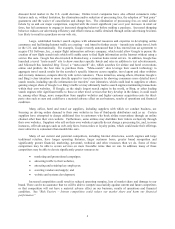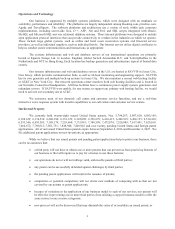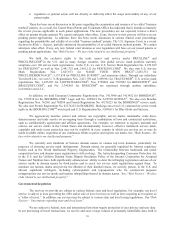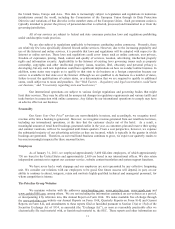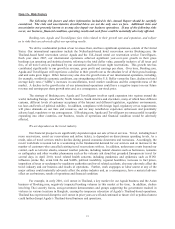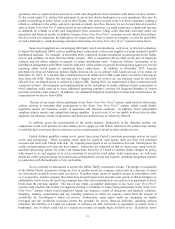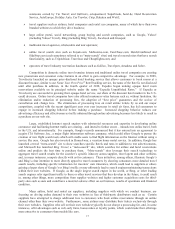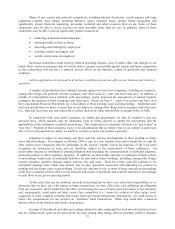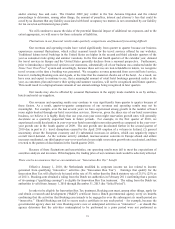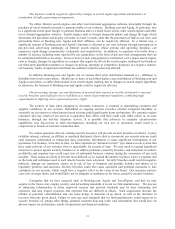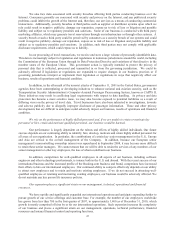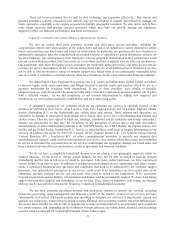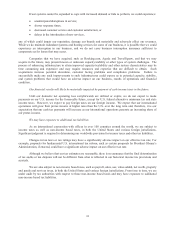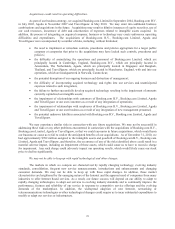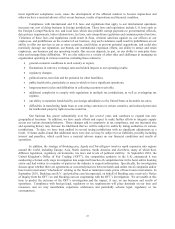Priceline 2010 Annual Report Download - page 91
Download and view the complete annual report
Please find page 91 of the 2010 Priceline annual report below. You can navigate through the pages in the report by either clicking on the pages listed below, or by using the keyword search tool below to find specific information within the annual report.17
asiarooms owned by Tui Travel; and Gullivers, octopustravel, Superbreak, hotel.de, Hotel Reservation
Service, AutoEurope, Holiday Auto, Car Trawler, Ctrip, Rakuten and Wotif;
x travel suppliers such as airlines, hotel companies and rental car companies, many of which have their own
branded websites to which they drive business;
x large online portal, social networking, group buying and search companies, such as Google, Yahoo!
(including Yahoo! Travel), Bing (including Bing Travel), Facebook and Groupon;
x traditional travel agencies, wholesalers and tour operators;
x online travel search sites such as Kayak.com, Mobissimo.com, FareChase.com, HotelsCombined and
SideStep.com (each sometimes referred to as “meta-search” sites) and travel research sites that have search
functionality, such as TripAdvisor, Travelzoo and Cheapflights.com; and
x operators of travel industry reservation databases such as Galileo, Travelport, Amadeus and Sabre.
Competition in domestic online travel remains intense and traditional online travel companies are creating
new promotions and consumer value features in an effort to gain competitive advantage. For example, in 2009,
Travelocity launched an opaque price-disclosed hotel booking service that allows customers to book rooms at a
discount because, similar to our Name Your Own Price® hotel booking service, the name of the hotel is not disclosed
until after purchase. In addition, in the fourth quarter of 2010, Expedia began making opaque hotel room
reservations available on its principal website under the name “Expedia Unpublished Rates.” If Expedia or
Travelocity are successful in growing their opaque hotel service, our share of the discount hotel market in the U.S.
could decrease. Online travel companies have also offered consumers value features such as, without limitation, the
elimination and/or reduction of processing fees, the adoption of “best price” guarantees and the waiver of
cancellation and change fees. The elimination of processing fees on retail airline tickets by us and our major
competitors, coupled with the recent significant year over year increases in retail air fares, has led consumers to
engage in increased shopping behavior before making a purchase. Increased shopping behavior reduces our
advertising efficiency and effectiveness as traffic obtained through online advertising becomes less likely to result in
a purchase on our web site.
Large, established Internet search engines with substantial resources and expertise in developing online
commerce and facilitating Internet traffic are creating – and intend to further create – inroads into online travel, both
in the U.S. and internationally. For example, Google recently announced that it has entered into an agreement to
acquire ITA Software, Inc., a major flight information software company, which could allow Google to pursue the
creation of new flight search tools which will enable users to find flight information on the Internet without using a
service like ours. Google has also invested in HomeAway, a vacation home rental service. In addition, Google has
launched a travel “meta-search” site to show searchers specific hotels and rates in addition to text advertisements,
and Microsoft has launched Bing Travel, a “meta-search” site, which searches for airfare and hotel reservations
online and predicts the best time to purchase them. “Meta-search” sites leverage their search technology to
aggregate travel search results for the searcher’s specific itinerary across supplier, travel agent and other websites
and, in many instances, compete directly with us for customers. These initiatives, among others, illustrate Google’s
and Bing’s clear intention to more directly appeal to travel consumers by showing consumers more detailed travel
search results, including specific information for travelers’ own itineraries, which could lead to suppliers or others
gaining a larger share of Google’s or Bing’s traffic or may ultimately lead to search engines maintaining transactions
within their own websites. If Google, as the single largest search engine in the world, or Bing, or other leading
search engines refer significant traffic to these or other travel services that they develop in the future, it could result
in, among other things, more competition from supplier websites and higher customer acquisition costs for third-
party sites such as ours and could have a material adverse effect on our business, results of operations and financial
condition.
Many airline, hotel and rental car suppliers, including suppliers with which we conduct business, are
focusing on driving online demand to their own websites in lieu of third-party distributors such as us. Certain
suppliers have attempted to charge additional fees to customers who book airline reservations through an online
channel other than their own website. Furthermore, some airlines may distribute their tickets exclusively through
their own websites. Suppliers who sell on their own websites typically do not charge a processing fee, and, in some
instances, offer advantages such as web-only fares, bonus miles or loyalty points, which could make their offerings
more attractive to consumers than models like ours.



